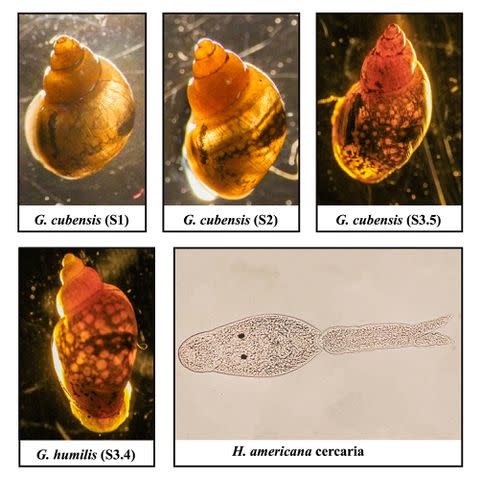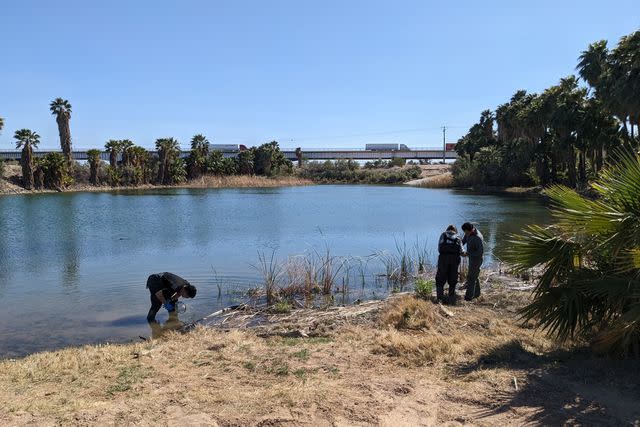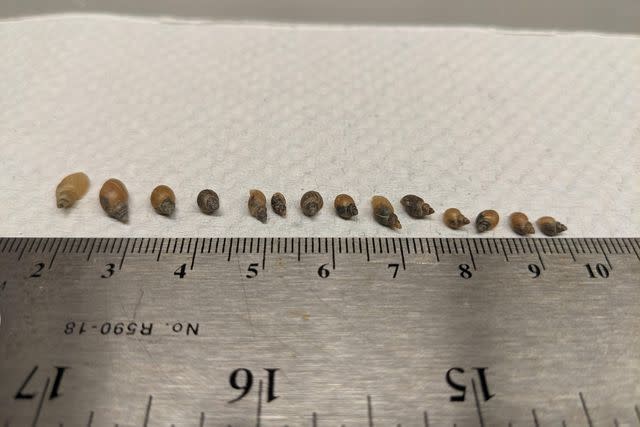'Dog-Killing Flatworm' Discovered in California: 'Organ Tissues Stop Functioning'
“Dogs can die from this infection," scientists warn of a parasite found in the Colorado River

Getty
dog running through river -- stock imageResearchers are warning California pet owners to keep their dogs out of rivers this summer after a potentially deadly species of worm has been found in the area for the first time.
Last week, scientists at University of California, Riverside shared a press release stating that a parasite, previously only found “in Texas and other Gulf Coast states” has made its way to the west coast and is now threatening local wildlife and pets.
Related: Expert Advice on How to Protect Pets from Ticks, Allergies, Fireworks and Other Summer Dangers
The specimen, known scientifically as Heterobilharzia americana, is a flatworm commonly referred to as liver fluke.

Adler Dillman/UCR
liver fluke flatwormIt is transmitted by snails and can survive for up to 24 hours before attaching to a host.
According to the press release, the flatworm can cause canine schistosomiasis, which affects dogs' liver and intestines.
“Dogs can die from this infection, so we are hoping to raise public awareness that it’s there,” said UCR nematology professor Adler Dillman. “If you’re swimming in the Colorado River with them, your pets are in peril.”

Adler Dillman/UCR
liver fluke flatworm research teamThe professor gathered a research team to observe sick canines in Blythe, a town near Joshua Tree National Park in Riverside County, after the dogs had spent time playing in rivers in the area.
Never miss a story — sign up for PEOPLE's free daily newsletter to stay up-to-date on the best of what PEOPLE has to offer, from celebrity news to compelling human interest stories.
Dillman’s team collected more than 2,000 snails, and published their findings in the journal Pathogens on March 13.

Adler Dillman/UCR
liver fluke flatworm, snails“We actually found two species of snails that can support H. americana in the river in Blythe, and we found both snails actively shedding this worm,” Dillman said. “Not only was it a surprise to find H. americana, we also did not know that the snails were present here.”
In addition to canines that are family pets, the parasite can also latch on to raccoons, marsh rabbits, dogs, horses, nutria, bobcats, mountain lions, opossums, and other mammals.
“It gets into the veins of the intestinal lining, and that’s where it develops into an adult and mates,” Dillman said. “The presence of the adults in the veins isn’t the problem. It’s the eggs that get into the lungs, spleen, liver, and heart. The immune system tries to deal with it, and hard clusters of immune cells called granulomas form. Eventually the organ tissues stop functioning.”
Related: Keeping Dogs and Cats Safe During an Eclipse: Expert Pet Advice on the Spring Solar Eclipse

Bing Guan/Bloomberg via Getty
Colorado River near Blythe, California -- stock imageInfected animals will likely show symptoms like loss of appetite, and could eventually experience vomiting, diarrhea, profound weight loss, and signs of liver disease.
Emily Beeler, a veterinarian with the Los Angeles County Department of Public Health, said if your pet has swam in the Colorado River and develops the aforementioned issues, they should see a veterinarian.
While this parasite can cause major health problems for animals, it’s important to note that humans would not face the same issues.
“It can cause swimmer’s itch, a red rash where it penetrates human skin. But it’s not able to cause infection,” Dillman said.
For more People news, make sure to sign up for our newsletter!
Read the original article on People.


